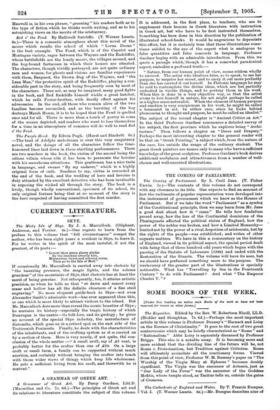A GRAMMAR OF GREEK ART. •
A Grammar of Greek Art. By Percy Gardner, Litt.D. (Macmillan and Co. 7s. 6d.)—The principles of Greek art and its relations to literature constitute the subject of this volume.
It is addressed, in the first place, to teachers, who are to supplement their lessons in Greek literature with instruction in Greek art, but who have to be first instructed themselves. Something has been done in this direction by the publication of illustrated school-books. It would be ungracious to depreciate this effort, but it is certainly true that these illustrations some- times exhibit to the eye of the expert what is analogous to false quantities and false concords in language. Professor Gardner begin: with an admirable introduction. From this we quote a passage which:though it has a somewhat paradoxical aspect, embodies a profound truth:— " Nature, from our human point of view, seems seldom wholly to succeed. The artist who idealizes tries, so to speak, to see her purpose, to surprise her secret, and to carry it out more perfectly than she has carried it out herself. In Platonic language he may be said to contemplate the divine ideas, which are but partially embodied in visible things, and to portray them in his work. When this is done in a very objective way, so that the artist seems to lose himself in nature, his art might perhaps be called in a higher sense naturalist. When the element of human purpose and emotion is very conspicuous in his work, he might be called a humanist in art. In either case, since he looks behind phenomena to thought and purpose, he must be called an idealist." The subject of the second chapter is "Ancient Critics on Art." In the third Professor Gardner commences a detailed survey of his subject, the first province which he explores being " Archi- tecture." Then follows a chapter on "Dress and Drapery." Perhaps the most interesting chapter to the general reader will be that on "Greek Painting," a subject which, from the nature of the case, lies outside the range of the ordinary student. The great Greek painters are names only to many who have a sufficient knowledge of the great sculptors. Professor Gardner's book derives additional usefulness and attractiveness from a number of well- chosen and well-executed illustrations.


































 Previous page
Previous page